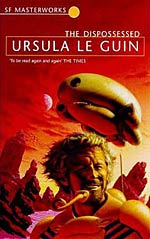
![]() bazhsw
bazhsw
10/19/2022
![]()
''The Dispossessed'? It's the one with the anarchist moon in it...'
I've a growing interest in reading fiction which explores notions of freedom, utopias and non-hierarchical communities of living. I've identified as an anarchist for nearly thirty years and have long known of Le Guin's anarchism and also this novel which features an anarchist community living on a moon. I'm surprised it has taken me this long to get round to it to be honest.
My expectations were raised for this book, knowing the subject matter and it's reputation of being a classic, written nearly fifty years ago. The basic premise is that an anarchist community a couple of hundred years ago migrate to a moon of a nearby planet and live there in near total isolation. Other than freight ships exchanging mining materials for goods there is no notion of trade with their former planet and little official communication. The main character Shevek is an anarchist physicist who is trying to develop a new physics theory that his community is not supporting and he leaves his anarchist moon to visit the planet of the propertarians.
What is most rewarding for me is knowing that the book is written by an anarchist and Le Guin's critique of her fictional anarchist moon Annares is rather brilliant. I have read some reviews where they suggest this treatment 'proves' anarchism doesn't work, or in some cases, they really don't know what they have read. I guess for some readers who have historically had limited exposure to anarchist ideas this is going to be a common problem.
Anarchists have often balanced the needs of the individual with the needs of the community. In the absence of laws and hierarchy and exploitation it is actually really hard to work through a lot of what we would need to do to make anarchy work. Following anarchist writing and engaging with other anarchists I don't think anyone has ever imagined utopias, rather a continued dialogue with ourselves and our communities about building the world we want to live in. Coming from this stance I can see Le Guin's thought process in action. For instance, whilst her technology is a little dated, she anticipates the impact of automation in 'fairly' allocating work and the difficulty of complex systems being centralised in error - a critique anarchists know and level at state capitalists / communists. So, when Le Guin identifies that, 'in this system this could happen here by accident' it's a warning and a consideration for anarchist thinkers and activists.
I also loved how she approached the theme of societal pressure and cultural norms and how the 'majority' can oppress a minority through social convention, or how people can obtain significant influence in communities and indirectly oppress others. In many ways this debate rages today, but I certainly think anarchist thought is more mindful of this now. That said, I do recall 'cults of personality' forming around people who did the most daring actions / most jail time in anarchist adjacent communities like the animal rights movement and it's something to consider.
At it's heart, the book is pleading first of all, for anarchist ideas not to be locked away or hidden. They must be exposed to people and ideas and communities we don't like. Second, whilst there is a critique of Annares and the capitalist world of Urras is depicted as complex, but ultimately similar to ours I do think this book promotes the utopia of Annares, just with no illusions.
So yes, the book is definitely thought provoking but is it a great book? Personally, I think the answer is no. It took me quite a while to get into and for a lot of the book not a lot happens. The big physics debate is interesting at an intellectual level but generally isn't that interesting. I do love the unpicking of Shevek, the main characters rationale for his actions. Once he has shaken off his constraints of his home and exposed to other societies and scientists he does come into his own. I think he is still an anarchist in the purest sense of the word as he adapts. The ending of the novel suggests hope and also actions in the spirit of anarchism.
There is a scene in the book that really reads out of place in 2022 and relates to sexual violence. I think Le Guin was trying to write a 'decadent West' analogy and her depiction of wealthy Urras women struggles a little. I get what she is trying to say about the objectification of women but I am not sure she is on the side of Urras women either. The scene is quite ugly and had me recoil a little at a character who I generally want to get behind. So, yeah, fifty years or so later I don't think it hangs together.
Am I glad I read it? Yes, definitely.
Is it a good book? Yes, especially for pondering big ideas about freedom.
Is it a great book? Perhaps not, but I am really glad I read it all the same.